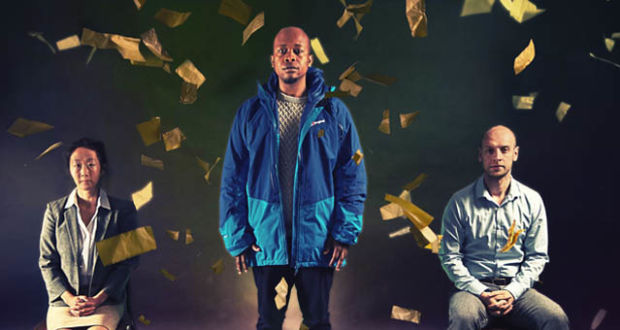Playwright Tim Cowbury and Director Mark Maughan are bringing immigration and refuge seeking to the stage with their touring production of The Claim, which will soon play London at Shoreditch Town Hall. Centring on a quintessentially British interview of an asylum seeker trying to stay in the country, the show is full of ‘laugh-so-you-don’t-cry’ moments and has us peeking into what happens when an asylum seeker only has words to save his life. We caught up with Maughan to discuss touring the country, his inspiration and the importance of discussing the asylum seeker system.
How’s the tour going?
Yeah, really well thank you. We’ve got a sort of staggered tour, so we opened at the Sheffield Crucible and that was great. Sheffield was the very first place that got city of sanctuary status. … And as I’m sure you know, Sheffield is quite a right-on and engaged city. So it was really nice to open it there and we sold out all the shows that we did there. Which was partly daunting, but partly brilliant, to be honest.
So we were there first, in Sheffield, and then we went to the completely other end of the country and a completely different type of place and space. We were in Exeter. In a lot of ways it’s a student town, it’s probably a bit less engaged, politically, … [but] it was really interesting to do it there. It was a completely different setting.
What was great was Riya Lewis, who’s our Engagement Producer. Wherever we go, we have a whole engagement programme around the piece. It’s sort of engagement and outreach. … It can be something as simple as a Q and A, but there [are also] artist workshops.
One of the things Riya does is reach out to people who are local to the theatre and might have personal experience of the asylum system or they might be about to go through it. And we’ve always found that just creates a very different experience for everyone in the audience, because the lights are not to fully to black in the beginning, [so] everyone can see each other in the space. And that doesn’t necessarily mean everyone that isn’t a white theatregoer is going through the asylum system, because that’s not true. But you can see when our outreach really kicks in and there is really a real range of people in the audience.
It’s just a very different experience in the room for the simple fact that people can see each other, and that people who’ve been through the system will laugh in recognition of what happened and the things that they see in front of them on stage. And it just means that the environment in the room has changed and that creates a different feel. And it means that this piece is — more than any theatre piece — it’s different every night.
It sounds like it would be less tense, using comedy to tackle the topic of immigration…
You’d think so, but I’ve found the opposite. I think that the expectation [is] that if you’re coming to see a piece about the asylum system, you’re going to come in and it’s going to be very straight-laced and serious from line one. But while there is absolutely a space for that type of work, that type of tone, that type of theatre, it’s not our piece and it’s not really been our interest.
The piece is called The Claim, and Tim hasn’t shied away from the fact that that sounds like a trial, and there is a that type of absurdity, sort of verging on farce, … that is our jumping off point. I think [in this show,] there is much more of a journey, something can sort of disarm the audience, and [make them think], ‘Hang on a minute, this is really upbeat, and they’re communicating well at the moment, but every time something slightly goes wrong, there’s this slight misunderstanding.’
I don’t want to give the show away for people who haven’t seen it, but starting off by slightly disrupting the expectation of the audience ultimately makes for a more arresting piece over the course of it. You know, the system itself is absurd. It’s not necessary that we made it up, the asylum system is absurd. It’s so absurd, it’s sort of having to laugh before you cry. And that sort of accounts for the tone as well, the reality of the situation.
What made you want to use comedy to an extent? Was it because the system is so absurd, that you have to laugh to stop yourself from crying?
Yeah, I mean, some people do stop laughing and do start getting quite emotional with it. To be honest, the comedy came from reading the transcripts and meeting the people that have been through this. Tim and I have been working on this piece for about three years now, and we’ve gone through a lot of research and development in that period. You know, we’ve met people and read the kind of questions that are asked, and they are just hilarious.
People are judged about how much they know about the wildlife in the country that they come from, and some people haven’t been in that country for most of their lives. If you asked me about the flora and fauna and the wildlife in the UK, I wouldn’t have a clue. I don’t have a clue about squirrels and foxes and things. I have a vague knowledge because I was taught at primary school, but it goes from that, to being able to remember really traumatic events, all the way to being asked to prove a slightly more cliché one. It doesn’t come into The Claim as much, but being asked to prove your LGBTQ in some ways. The system is completely absurd. I think it came from reality. The Claim takes reality and then abstracts it into the piece we’re now showing in front of audiences.
The Claim seems more necessary now than ever before with everything happening with immigration, both here and abroad. What made you want to direct it?
When Tim and I started working on this, the “crisis”, that hadn’t happened yet. I was interested in this citizenship test that people have to take in order to gain status in the UK, which is obviously different to the asylum system because you don’t normally take that test until you’ve been in the UK for quite some time.
I met Tim and spoke about my idea, and he was quite interested in language and power; making a piece on language and power. I think when we first started emailing and getting in touch, Tim was at a conference in France watching a terrible translator and [noticed] the amount of power that that person has to completely mess up the communication of information.
Then from our initial research, we came across the asylum system, more specifically the interview. Which is the second interview those seeking asylum go through and the process. And that is sort of just a hideous mess, is the only way to describe that interview. It’s just, the more we found out about it, the more we realised what goes on there and the lack of information people have, the lack of support, in terms of legal support, mental and physical health support. People go straight into the interview completely unaware of what’s about to happen to them. So I think that when we discovered that happened, we knew that absolutely had to be the focus of the piece.
What’s unique about The Claim is it doesn’t so much focus on people’s stories, it’s more about the system that clicks into place when people arrive into the UK or have been in the UK a while and are now going to claim asylum. That’s the focus of the piece because that is something that is happening mainly in housing in Croydon, the home office. And for us, that was important to focus on, because so few people know about it.
The piece raises awareness, and you know, if you’ve been through the system it’s kind of like a reflection of the absurdity of the situation. If you haven’t been through the system and you’re not a refugee or an asylum seeker, it kind of asks people to really question your relationship from people who are from different places.
We have found that it has a strong effect on people. Both people get enraged by the system and people start asking themselves what they can do, people ask themselves about their own relationship with immigration and people who are immigrants. I use that term “immigrant” on purpose [and] in a wider sense than just asylum seekers and refugees.
Someone came up to me after one of the shows at Exeter and went, ‘I just realised how prejudice I am. I never thought that people didn’t just come off straight off the boat and seek asylum. I never thought people might stay here for a while.’
Serge, who is the asylum seeker in The Claim, has been in the UK for a while, before he goes for his interview, which causes him a few problems. It has a variety of impact on people, depending on who they are.
What are you hoping this play will do?
I’m between two camps. There’s one camp that says theatre can’t change anything, which I think is rubbish. Then there’s the other camp, which gears a quite short-sighted belief that theatre can do more that it can do in terms of reaching people.
I hope the piece, when it does reach people, [will] really ask them to question their own relationship with people who have a different identity to them. I also hope it raises awareness about the system and it [makes] change both through the piece and the engagement activity we have.
We’re working with some brilliant organisations who do the hard graft. We’re working with Queen Mary’s legal advice centre and through our relationship with them, we’re able to offer a legal workshop for people who are probably about to go through the system, about their claims and what might be expected. We’re also working with Right to Remain, which run a more general workshop for allies and people who want more information about their interviews, [and we’re also] doing pretty direct activities that are related to the show.
Some of the people engaging in those activities might not even come and see the show because it might be triggering for them, because it might not be the thing they need to do at the moment. But if we’re able to still engage with them through the project at large, then great. But the vast majority will come and see the show, and I hope it asks people to reflect on themselves, on this system that is in place and how the UK treats people that aren’t born in the UK.
How would you describe this play in one word?
Whirlwind, I think.
The Claim will play at Shoreditch Town Hall from 16-26 January as part of a broader UK tour.
 Everything Theatre Reviews, interviews and news for theatre lovers, London and beyond
Everything Theatre Reviews, interviews and news for theatre lovers, London and beyond



